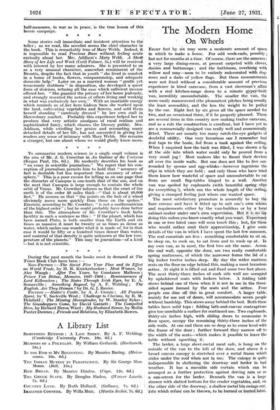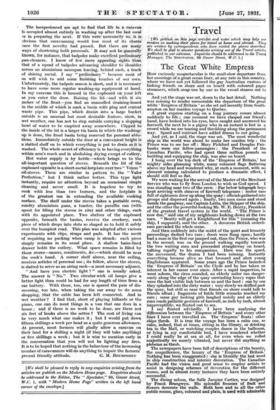The Modern Home
On Wheels
EIGHT feet by six may seem a moderate amount of space in which to make a home. For odd week-ends, possibly ; but not for months at a time. Of course, there are the annexes: ti very 'large dining-room, at present carpeted with clover, daisies and buttercups ; and the -bathroom, overhung with willow and may—soon to be entirely redecorated with dog. roses and a dado of yellow flags. But these measurements were not fixed without a considerable amount of previous experience in hired caravans, from a vast showman's affair with a real kitchen-range down to a minute gypsY-built van, incredibly uncomfortable. The smaller the van, the more easily manoeuvred (the pleasantest pitches being usually the least accessible), and the less the weight to be pulled by the car. Eight feet by six gives all the space needed foi- two, and an occasional three, if it be properly planned. There are several firms in this country now making trailer caravans, and as a rule the construction is excellent, but I have yet to gee a commercially designed van really well and economically fitted. There are usually too many catch-the-eye gadgets of doubtful utility. One very luxurious one I remember had Deal taps to the basin, fed from a tank against the ceiling. When I enquired how the tank was filled, I was shown a lip at the side into which water could only be poured from a very small jug ! Most makers like to flaunt their devices all over the inside walls. But one does, not like to live sur- rounded by spoons and egg-whisks—however ingenious the Clips in which they are held ; and only those who have tried them know how wasteful of space and uncomfortable to eat from are small flap-tables hinged to a wall. Anoth4 van was spoiled by cupboards (with beautiful- spring -clips for everything !), which ran- the whole length of the deilinu, giving a cramped feeling just where one wanted space.
The most satisfactory procedure is assuredly to buy tl+ bare carcase and have it fitted up' to suit one's own vilifibs: and requirements either by the van-builders or by a- local cabinet-maker under one's own supervision, But it is no 'die doing this unless you know exactly what you want. Experien+ in one or two hired vans will soon teach this ; but, for those who would -rather omit their apprenticeship, I give some details of the van in which I have spent the last few summers. The real essentials are five : something comfortable to sit oil, to sleep on, to cook on, to eat from and to wash up at. Iii my own van, as in most, the first- two are the same. Acrotis the end wall, opposite the doer, are two really comfortable spring mattresses, of which the narrower forms the lid of a big locker twelve inches deep. By day the wider mattress rests on the floor on edge behind this, making a most luxuricuis settee. At night it is lifted out and fixed some two feet above. The next thirty-three inches -of each side wall are occupied by upholstered seats with lockers below. A folding table stows behind one of these when it is not in use in the three- sided square formed by the seats and the settee. Four people can dine off; this in great comfort. A larger table, mainly for use out of doors, will accommodate seven people without hardship. This stows away behind the bed. Both these tables have solid tops : folding lath-and-canvas contraptions give too unreliable a surface for continued use. Two cupboards, thirty-six inches high, with sliding doors to economize in floor space, occupy the remaining thirty-three inches of the side walls. At one end these are so deep as to come level with the frame of the door ; further forward they narrow off to the width of the seats—which makes it possible to leave the table without upsetting it.
The larder, a large sheet-metal meat safe, is hung on the outside of the van to the left of the door, and above it a broad canvas canopy is stretched over a metal frame which slides under the roof when not in use: The canopy is quite indispensable in sheltering the doorway and -larder in bad weather. It has a movable side curtain which can be arranged as a further protection against driving rain or as a sun-screen for the larder. Beneath the van is a large drawer with slatted bottom for the cruder vegetables, and, on the other side of the doorway, a shallow metal bin Swings out, into which refusd can be thrown, to be burned or buried later. The inexperienced are apt to find that life in a caravan is occupied almost entirely in washing up after the last meal or in preparing the next. If this were' necessarily so; it is obvious that caravanning would lose most of its charm once the first novelty had passed. But there ..are many ways of shortening both processes.It may not be generally known, for instance, that tadpoles make excellent preliminary pan-cleaners. I know of few more appealing sights than that of a squad of tadpoles advancing" shoulder to -eloulder across an aluminium saucepan leaving, behind each, a track of shining metal. I say " preliminary " because most of us will wish to add some finishing touches of our -own. Unfortunately, the tadpole season is short,- and it is necessary to have some more regular washing-up equipment at hand. In my caravan this is housed in the cupboard on your left as you enter the door. Raising the. lid—and with it six inches of the front—you find an enamelled draining-board in the middle of which is sunk a basin with plug and central waste pipe. This pipe, which drains= into a large bucket outside is an unusual but most desirable feature, since, in wet weather, one has not to step outside,. carrying a slopping bowl of water to be emptied away somewhere. Clipped to the inside of the lid is a larger tin basin in which the washing- up is done, the fixed basin being reserved -for personal ablu- tions. Immediately outside the door at a convenient height is a slatted shelf on to which everything is put to drain as it is washed. The whole secret of efficiency is in -having everything within arm's reach and in abolishing drying except of cutlery.
Hot water supply is by kettle—which' brings us to the all-important question of stoves. Beneath the lid of the cupboard opposite is a sheet-metal hotplate over two " Venus " oil-stoves. These are similar in pattern to the Valor Perfection," but I think rather hotter. This type light instantly, require no attention beyond an occasional simple cleaning and never smell. It is hopeless to try to cook with less than two burners, and the hotplate is of the greatest use in extending the available cooking surface. The shelf under the stoves takes a portable oven, sundry aluminium pans, a toaster, the paraffin can (with spout for filling the stoves in situ) and other things, each with its appointed place. Two shelves of the cupboard opposite, beneath the basins, receive the crockery, each piece of which drops into slots so shaped as to hold it safely over the bumpiest road. This plan was adopted after various experiments with clips, straps and pads. It has the merit of requiring no packing when . camp is struck: each piece simply remains in its usual place. A shallow baize-lined drawer holds the cutlery. What space remains is filled by those stores—sauces, condiments, &c.—which should be near the cook's hand. A corner shelf above, near the ceiling, receives articles of personal use ; its fellow, above the stoves, is slatted to serve as an airing rack—a most necessary adjunct.
" And have you electric light ? " one is usually asked. The answer is " No." Two circular-wick oil lamps give a better light than could be had for any length of time from a car battery. With these, too, one is spared the pain of dis- covering, too late, when taking the car away to do some shopping, that the cable has been left connected. And in wet weather ? I find that, short of playing billiards or the piano, one can do most things in a van that one does in a house ; and if there is no work to be done, are there not six feet of books above the settee ? The cost of living can be very much what one makes it ; but I would put down fifteen shillings a week per head as a quite generous allowance. At present, most farmers will gladly allow a caravan = on their land for a shilling a night (if they will take anything) or five shillings a week ; but it is wise to mention early. in the conversation that you will not be lighting any fires. It is to be hoped that nothing in the behaviour of the increasing number of caravanners will do anything to impair the farmers'







































 Previous page
Previous page